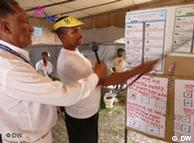| ||
Earlier, Prime Minister Meles Zenawi said Ethiopia had been testing jamming equipment, but there had been no formal decision to block the US station. The Amharic Service has experienced interference since late February. Mr Meles also compared the VOA's transmissions to broadcasts in Rwanda in the mid-1990s that incited genocide. "We have for some time now been trying to beef up our capacity to deal with this, including... jamming," Mr Meles replied  In a statement, VOA director Danforth Austin said that any comparison of VOA programming to Rwandan broadcasts inciting genocide in the 1990s was "incorrect and unfortunate". In a statement, VOA director Danforth Austin said that any comparison of VOA programming to Rwandan broadcasts inciting genocide in the 1990s was "incorrect and unfortunate"."The VOA deplores jamming as a form of media censorship wherever it may occur," he said, adding that the station's Amharic Service was required by law to provide accurate and objective information. The VOA and other foreign media organizations say broadcasts in Amharic - the country's most widely spoken language - have been jammed around elections in the past. According to 2nd August 2010 message from VOA. Greetings from Voice of America! Over recent months we’ve appreciated hearing from you about our Horn of Africa broadcasts to our Ethiopian and Eritrean audiences. For 28 years Voice of America has broadcast uncensored news to both countries, but that service has been recently interrupted by the Ethiopian government. And they have blocked access to our Horn of Africa web site for all who live in Ethiopia. We value your views and during a crucial time in Ethiopian domestic affairs, we wanted to offer you by e-mail a new way to receive our news and feature programs. Our broadcasters continue to work diligently to reach many parts of the world with news in Amharic, Afaan Oromoo and Tigrigna, but most listeners in Ethiopia cannot get that news now. So, we invite you to receive the Horn of Africa news Monday through Friday. You can subscribe at http://www1.voanews.com/amharic/email/ If you cannot access our site, click on http://www.melkamzena.com. You will be able to hear a recent broadcast in any of our three languages. Or, click on “newsletter” and enter your e-mail address and Monday through Friday you’ll receive links to our top stories of the day about Ethiopia. Your subscription to our Horn newsletter is one of many ways VOA is reaching out to our loyal listeners during this communications crisis. We invite you to forward this e-mail to anyone in Ethiopia or anywhere else in the world who would like to receive our Horn of Africa newsletter. | ||
2010年8月3日火曜日
2010年6月25日金曜日
情報機関が『地下放送』 脱北者関与 反政府勢力装う
情報機関が『地下放送』 脱北者関与 反政府勢力装う
2010年6月23日 07時08分
| ソウル近郊にある「人民の声放送」の送信施設。フェンスと鉄条網に囲まれた敷地内は立ち入り禁止だ |
 |
韓国軍哨戒艦の沈没事件が国連安全保障理事会で協議される中、五百万人近くが死傷した朝鮮戦争(一九五〇~五三年)勃発(ぼっぱつ)から二十五日 で六十年を迎える。韓国政府は沈没事件の制裁措置として、軍事境界線付近で宣伝放送を開始。その水面下にある非軍事的戦術「心理戦」の実態が明らかになっ た。 (ソウル・城内康伸、写真も)
六月初めの未明、ソウルで短波ラジオをある周波数に合わせると、激しい雑音とともに「朝鮮語」による 男性のアナウンスが聞こえてきた。
「朝鮮労働者総同盟がお届けする人民の声放送を始めます。独裁政権と戦うみなさんの決死組織です」
この日の放送の話題は哨戒艦沈没事件だ。北朝鮮の朝鮮労働党党員の夫妻が対話する形で「沈没の原因はわが軍の攻撃だ。それなのに(北朝鮮の)上層部は南 (韓国)の捏造(ねつぞう)としている」と伝えた。続いて金正日(キムジョンイル)政権を非難。放送は北朝鮮内の反政府勢力が流しているように聞こえた。
その送信施設がソウル近郊の田園地帯にあるのを見つけた。広大な敷地に巨大なアンテナ塔が十六本。施設の外にはフェンスが張り巡らされ、監視所もある。近 くでラジオの電源を入れると、放送には雑音もなく普通に受信できた。電波は毎日十八時間、北朝鮮に向かって飛んでいる。
「人民の声は、実 は国家情報院(韓国の情報機関=国情院)が運営している」。“怪電波”の正体を、情報当局筋が明かした。
三十年余の短波ラジオ受信歴があ るアジア放送研究会の山下透代表は「八六年六月二十五日に開局し、かつては平壌が発信地と放送していた」と説明。
放送にかかわった男性は 「放送原稿の執筆やアナウンスは、主に国情院が選抜した脱北者が携わっている」と証言する。別の関係者は「盧武鉉(ノムヒョン)前政権では金正日と呼び捨 てにしないよう上部から指示があった。李明博(イミョンバク)政権誕生後、激しい批判が復活した」と指摘した。
だが、国情院は「対北放送 はしていない」と否定しており「人民の声」の運営は、極秘事項なのだ。
こうした放送は地下放送と呼ばれ、敵対勢力や相手国内の動揺や反乱 の扇動を目的とする。放送にかぶさる雑音は、北朝鮮が住民に聞かせないようにする妨害電波だった。
(東京新聞)
2010年6月13日日曜日
Iran Jams Satellite Signal
The Iranian government has continued to increase its jamming of satellite television signals in Iran, thereby prohibiting access protected by international treaties

Photo: photos.com
Satellite Dishes
According to complaints by Iranian citizens, the electronic interference was evident when the Voice of America's Persian News Network recently broadcast an HBO documentary on the life of Neda Agha Soltan, the young woman killed during peaceful protests following the election last year. Her death was captured on video, and she has become a symbol of the aspirations of the Iranian people for freedom and justice.
Earlier this year, the Iranian government also jammed VOA and other international broadcasts when Iran's leadership sought to suppress opposition protests on the 31st anniversary of the Islamic Revolution. At that time, VOA, Deutsche Welle, and the BBC issued a joint statement condemning the jamming, saying "it contravenes international agreements and is interfering with the free and open flow of international transmissions that are protected by international treaties."
In addition, the broadcasters noted, the Iranian authorities "are using the same satellite services to broadcast freely around the world including broadcasts in English and Arabic; at the same time they are denying their own people programs coming from the same satellites from the rest of the world."
Iranian authorities have attempted to keep information from the citizens of Iran through tactics such as jamming signals or closing newspapers or filtering the internet. They also continue their arrests and detentions of citizens with any association to the political opposition.
Despite the attempts of the leadership in Iran to deny outside information to its citizens, those in Iran who are trying to exercise their universal rights should know that the world is watching. As President Barack Obama has said, "Suppressing ideas does not succeed in making them go away. . . . History will be on the side of those who seek justice."
voice of america
2010年5月31日月曜日
Jamming of DW is part of Ethiopia's campaign against press freedom
Press Freedom | 28.05.2010
Jamming of DW is part of Ethiopia's campaign against press freedom
"These methods are a violation of international law and -- what is even more important -- they are a violation of human rights, particularly the right to freedom of information for people all over the world," Deutsche Welle's director general Erik Betterman said following the news of the intentional disruption of Deutsche Welle broadcasting during the election by the Ethiopian government.
Just as in 2007 and 2008, Deutsche Welle's Amharic radio broadcasts were subjected to jamming, i.e. the deliberate interference of Deutsche Welle's short wave signal.
Two and three years ago it was the invasion of Ethiopian soldiers into Somalia and increasing border tensions with Eritrea that led the government in Addis Abeba to disrupt transmission of Deutsche Welle.
 Bildunterschrift: Großansicht des Bildes mit der Bildunterschrift: DW Director General Erik Bettermann protested against the jamming efforts Bettermann has called the renewed interference of DW's frequencies a drastic attack against "
Bildunterschrift: Großansicht des Bildes mit der Bildunterschrift: DW Director General Erik Bettermann protested against the jamming efforts Bettermann has called the renewed interference of DW's frequencies a drastic attack against "
Jamming linked to elections
According to Ambroise Pierre, director for Africa at Reporters without Borders in
"The jamming of Deutsche Welle in
On the world stage Prime Minister Meles, a Marxist and former guerilla fighter who has led the country for 19 years, presents himself as
Freedom of press not respected
In May after the jamming of the Amharic broadcasts of Voice of America became public, Reporters without Borders sent an open letter to Meles, urging him to uphold the freedom of the press during the election. That demand was ignored, said
"With our letter we wanted to appeal to the prime minister to not interfere with the work of the media. But he obviously didn't heed our demand, since Deutsche Welle is being jammed now as well."
 Bildunterschrift: Großansicht des Bildes mit der Bildunterschrift: The Amharic department at Deutsche Welle in Bonn, GermanySince the election of 2005 which was marred by 200 deaths and charges of massive fraud, the Ethiopian government has been engaged in an aggressive lobbying campaign against the Amharic service of Deutsche Welle. These efforts culminated in a complaint to the German parliament alleging that DW's reporting was biased. While this accusation could be invalidated after broadcast manuscripts were re-translated into German, the jamming was only stopped after the intervention of Chancellor Angela Merkel in Addis Abbeba in 2008.
Bildunterschrift: Großansicht des Bildes mit der Bildunterschrift: The Amharic department at Deutsche Welle in Bonn, GermanySince the election of 2005 which was marred by 200 deaths and charges of massive fraud, the Ethiopian government has been engaged in an aggressive lobbying campaign against the Amharic service of Deutsche Welle. These efforts culminated in a complaint to the German parliament alleging that DW's reporting was biased. While this accusation could be invalidated after broadcast manuscripts were re-translated into German, the jamming was only stopped after the intervention of Chancellor Angela Merkel in Addis Abbeba in 2008.
According to Bettermann the continued attacks by the Ethiopian government and the blocking of unpopular Internet sites through the aid of Chinese software and hardware is a confirmation that
"Since this isn't the first time that we are being jammed, this shows that what we transmit to
Ethiopian authorities could not officially be reached for comment. However, confronted with the alleged jamming, Prime Minister Meles denied any interference with DW's signal in a conversation with the head of the EU's election observer mission (EU-EOM) in
Listeners from all over the world have protested against the jamming during the election weekend. In
Author: Ludger Schadomsky (mik)
Editor: Kristin Zeier
2010年5月28日金曜日
Ethiopia jams Deutsche Welle before and during elections
Ethiopia jams Deutsche Welle before and during elections
Text of press release by German international broadcaster Deutsche Welle on 26 May
Deutsche Welle [DW] director-general Erik Bettermann has condemned the jamming of DW’s radio programming in Ethiopia. Before and during the parliamentary elections in Ethiopia on Sunday, May 23, Deutsche Welle’s shortwave broadcasts of its Amharic programme was blocked several times.
“This blatant violation of international law and against the basic rights related to the freedom of information is not acceptable,” said Bettermann. “People must be able to form an opinion based on independent and uncensored information - especially in the run-up to elections. Without international sources of media, the censored, national media remains the only choice.”
Deutsche Welle has informed the German Embassy in Addis Ababa and the head of the EU’s Election Observation Mission.
International broadcasters have been affected by jamming several times in the last few months in Ethiopia. Bettermann sees Deutsche Welle as the “German voice of human rights”. He went on to say that DW, along with other independent international broadcasters “factor greatly into the effort to foster human rights in even more countries around the world and shouldn’t be underestimated”.
DW’s radio service for Ethiopia has been broadcast since 1965 and has been affected by jamming time and time again. Although the administration in Addis Ababa denied using jamming techniques in the past, they have recently officially admitted to blocking international media.
Amharic programming from Deutsche Welle and Voice of America are heard daily by millions of Ethiopians - something the local government disagrees with.
The German government has intervened in the past. In 2007, they contacted Prime Minister Meles Zenawi after the DW’s radio service was blocked for months and the source of the jamming in Ethiopia had been identified.
At the beginning of May, Deutsche Welle, Radio Netherlands Worldwide, BBC, Radio France Internationale and Voice of America made a joint declaration on World Press Freedom Day, specifically addressing the free flow of uncensored information. There is an increasing number of countries that are experiencing jamming with regards to satellite and shortwave transmissions as well as the blocking of websites.
(Source: Deutsche Welle press release in English 26 May 10 via BBC Monitoring)
2010年4月3日土曜日
Broadcasting body calls on Iran to stop jamming
Broadcasting body calls on Iran to stop jamming
GENEVA (AFP) - The UN's telecommunications agency called on Iran Friday to stop jamming foreign radio and television broadcasts, following European complaints.
ecommunications Union spokesman Sanjay Acharya said that "interference emanating from the territory of the Islamic Republic of Iran... appear to be of a nature which is forbidden under radio regulations."
The ITU's radio regulation board "urged the administration of Iran to continue its efforts in locating the source of interference and to eliminate it as a matter of the highest priority." he added.
The regulation board issued its call following a complaint lodged by France on behalf of the management of the Eutelsat telecommunications satellite whose emissions to Iran were being jammed.
Acharya acknowledged that the ITU could not impose any sanctions against Tehran before its next world congress in some two years' time.
"What we can do at this moment is to add pressure on the government of Iran," he said.
EU foreign ministers on Monday vowed to "act" against the Iranian state's unacceptable jamming of satellite broadcasts and Internet controls, showing the bloc's increasing impatience with Tehran.
Nearly 70 foreign radio and television stations that transmit via the Eutelsat satellite to Iran were jammed on February 11, the 31st anniversary of the Islamic Revolution, they said.
Iranian authorities have cracked down on the media and arrested scores of journalists since anti-government protests erupted after President Mahmoud Ahmadinejad's disputed re-election last June.
The Islamic regime has been targeting the BBC's Persian-language broadcasts in particular.
EU sources said that Iranians' text messages were also being intercepted by the authorities in Tehran.
The bloc's foreign affairs chief Catherine Ashton said she was "extremely concerned" about Iran's jamming tactics, without saying what precisely Europe would, or could, do to counter Tehran's tactics.
Meles Vows to Authorize Jamming VOA Amharic Broadcasts
| Meles Vows to Authorize Jamming VOA Amharic Broadcasts | |
| By Peter Heinlein Addis Ababa 19/03/2010 |
The Ethiopian leader denies having authorized the interference VOA Amharic listeners have been experiencing since February 22. But speaking to reporters Thursday, he acknowledged ordering preparations for jamming, and said as soon as the equipment is working properly, he would give the go-ahead.
![[insert caption here] [insert caption here]](http://www.voanews.com/horn/images/Meles-Zenawi-AFP031809_1.jpeg) |
| [Meles Zenawi] |
Mr. Meles said what listeners may have been experiencing for the past four weeks is testing of the jamming equipment.
In justifying his decision to order jamming, the prime minister compared VOA's Amharic Service to the infamous Radio Mille Collines, which broadcast hate messages blamed for inciting the 1994 genocide in Rwanda.
"We have been convinced for many years that in many respects, the VOA Amharic Service has copied the worst practices of radio stations such as Radio Mille Collines of Rwanda in its wanton disregard of minimum ethics of journalism and engaging in destabilizing propaganda," Meles said.
Voice of America Director Danforth Austin issued a statement Thursday saying, "any comparison of VOA programming to the genocidal broadcasts of Rwanda's Radio Mille Collines is incorrect and unfortunate."
He added, "The VOA deplores jamming as a form of media censorship wherever it may occur.
"The statement said VOA's Amharic Service is required by law to provide accurate, objective and comprehensive news and information and abide by the highest journalistic standards."
Austin also noted that "while VOA is always ready to address responsible complaints about programming, the Government of Ethiopia has not initiated any official communication in more than two years."
VOA language service broadcasts to Ethiopia have been jammed in the past around election times. The next election for parliament is just over two months away. But in past instances, the government denied being responsible for the jamming.
Monitors say the recent jamming has only been aimed at Amharic broadcasts, and has not affected other Horn of Africa transmissions to Ethiopia in Afan Oromo and Tigrigna. They are heard on the same frequencies before and after the Amharic broadcast.
The Voice of America is a multi-media international broadcasting service funded by the U.S. Government. VOA broadcasts more than 1500 hours of news and other programming every week in 45 languages to an audience of more than 125 million people.
